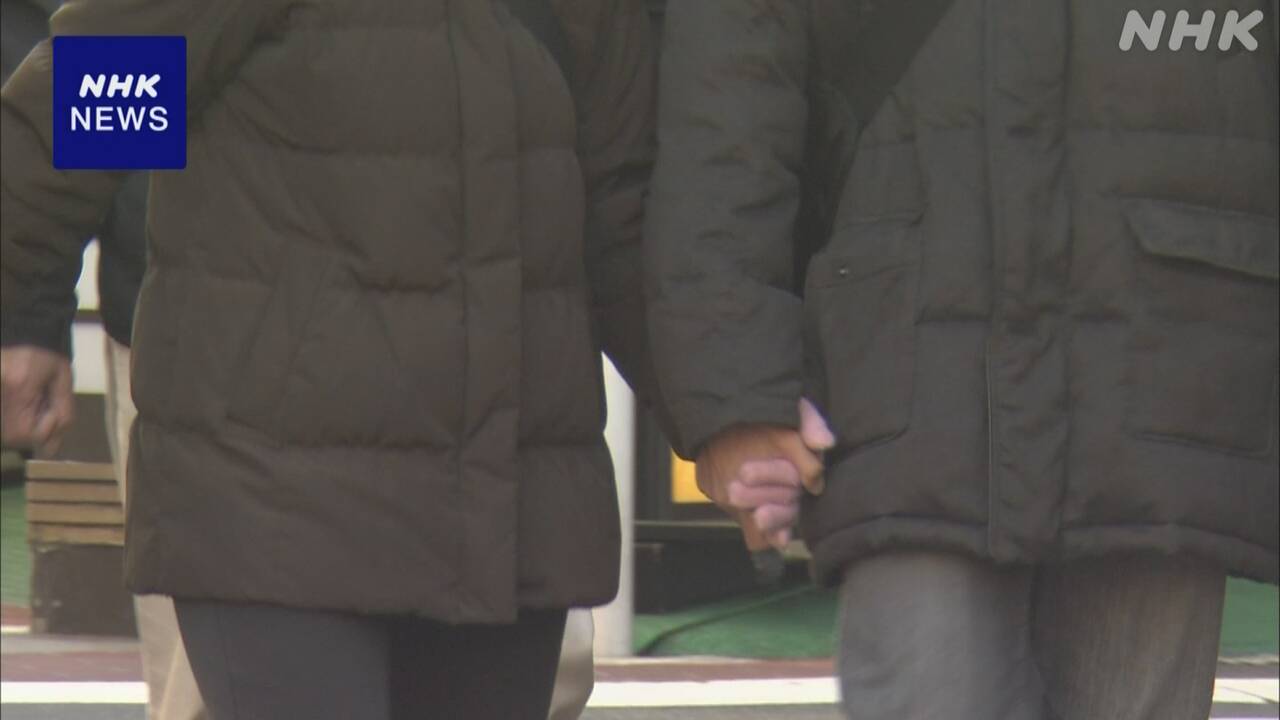It has been announced that 12 people living in Tokyo and other areas will file a lawsuit in March demanding compensation from the government, alleging that the provision of the Civil Code that does not allow married couples to have separate surnames violates the Constitution.
The same provision has been twice ruled constitutional by the Grand Bench of the Supreme Court, but the defense team argues that ``the situation is changing, with increasing awareness of the need for married couples to have separate surnames.''
The people filing the lawsuit are a total of 12 people, including five common-law couples and one married couple living in Tokyo, Hokkaido, Nagano prefectures, and other areas.
On March 8, the 12 people filed a lawsuit against the government in Tokyo, claiming that the provisions of the Civil Code and Family Register Act that do not allow married couples to have separate surnames "violate the Constitution, which guarantees the freedom of marriage, and are invalid." We plan to file a complaint at the Sapporo District Court.
The 12 people and their defense team
argue that when people get married and change their surnames, it becomes difficult to maintain the trust and reputation that was tied to their maiden names, and many people feel a loss of identity.
Additionally,
couples who gave up on marriage and chose common-law marriage are also at a disadvantage.
People seeking separate surnames for married couples have repeatedly filed lawsuits over the same provision, and in 2015 and 2021, the Supreme Court's Grand Bench, which includes all 15 justices, took part, and both cases resulted in majority opinions. Although the judgment was that it does not violate the Constitution, five people in 2015 and four in 2021 said that it violates the Constitution.
The defense team is appealing for a change in the Supreme Court's decision, saying, ``Awareness is increasing, with the Japan Business Federation and many local councils requiring couples to have separate surnames, and the situation is changing.''
``Different surnames for husband and wife'' Previous Supreme Court decisions
The Grand Bench of the Supreme Court has ruled twice, nine years ago in 2015 and three years ago in 2021, that the Civil Code provision that does not allow married couples to have separate surnames is ``constitutional'' and does not violate the Constitution.
In its first judgment nine years ago, the Supreme Court ruled, ``The system of husbands and wives using the same surname has been firmly established in our society, and it is important that the family, which is a group unit in society, be given one name. It is reasonable to do so."
On the other hand, he urged debate in national politics, saying, ``The current system depends in no small part on how society perceives it, and what the system should be should be discussed and judged in the Diet.''
At that time, five of the 15 judges on the Grand Bench expressed the opinion that it was ``unconstitutional'' or dissented, and three of these female judges jointly issued an opinion.
The three female judges said, ``The current situation in which 96% of married couples take the husband's last name is a result of women's weak social and economic position.In many cases, women are the only ones who feel a sense of loss of self.'' The court ruled that this violates the Constitution, saying, "This is not based on the equality of both sexes."
In a decision made three years ago, the Supreme Court said, ``Even taking into account changes in society and changes in public consciousness after the 2015 ruling, we do not find it necessary to change the judgment that the law does not violate the Constitution.'' It was determined that this did not violate the Constitution.
He added, ``The question of what kind of system is appropriate to adopt is different from the question of examining whether it violates the constitution in a court of law.The nature of the system should be debated and determined in the Diet.''
At that time, four of the 15 judges ruled that this was a violation of the Constitution, pointing out that ``it goes against the spirit of the Constitution, which guarantees the freedom of marriage and the equality of husband and wife, and amounts to unwarranted state intervention.'' did.
Keidanren “Introducing ``selective separate surnames for married couples'' to hinder career development”
Keidanren says that the current system, which does not allow married couples to have separate surnames, may hinder career development, and calls for the introduction of ``selective separate surnames for married couples.''
In mid-January, the Keidanren's Diversity Promotion Committee held a meeting with Minister Kato, who is responsible for women's empowerment and gender equality, and called for the realization of optional separate surnames for married couples, where couples can each choose their own surnames before marriage if they wish. Ta.
Among them,
▽When doing business overseas, your surname before marriage is not written on your passport, which can be a hindrance, and
▽When you are building up your career, such as in a research position. , pointed out that there could be disadvantages.
At a press conference in February, Keidanren Chairman Tokura said, ``I don't know why this has been the case for so long, considering that the National Legislative Council recommended the introduction of selective surnames for married couples in 1996.'' I heard that Japan is the only country in the world where this happens."
She went on to say, ``I have heard that there are some troubles when visiting public institutions overseas.I would like the government to move forward with 1-chome 1-1 support for women's work style reform.'' Keidanren also expressed its intention to compile recommendations to the government in the first half of next fiscal year.

